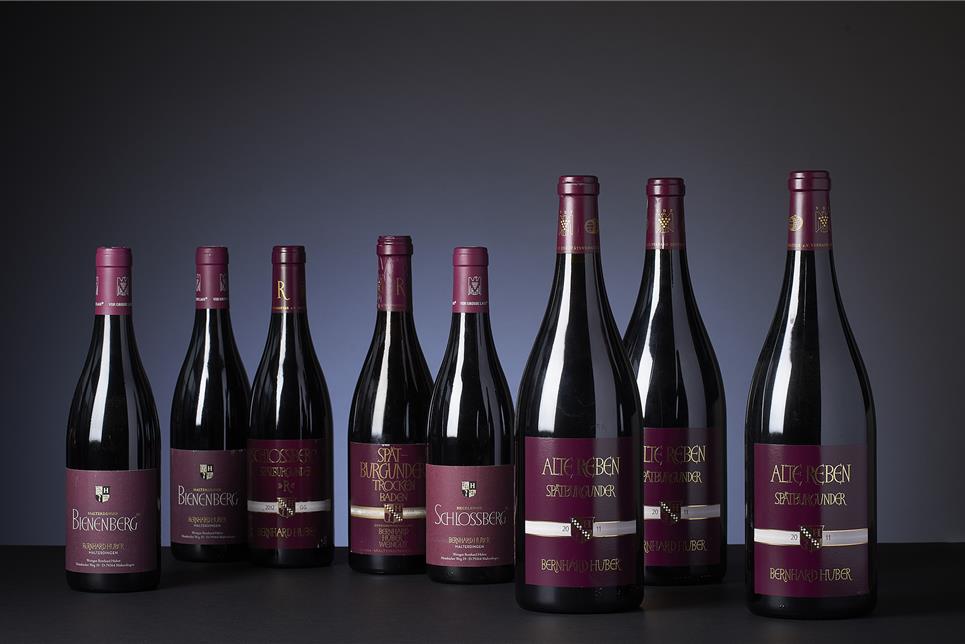
Pinot Noir - Weingut Bernard Huber
Anyone who tastes a Spätburgunder (Pinot Noir) from Huber once will never forget it: it is a wealth of berries that passes the lips.
The estate and its history
The estate stands in the small village of Malterdingen. The village's wine history goes back to the time Cistercian monks in the 13th century and before. When these discovered the same rock (shell limestone) in the village as found in Burgundy, they enthusiastically planted the same varieties of wine: chardonnay and pinot noir. Remarkably, the Huber estate stands today on the same site as the monks' estate and inhabits te very same vineyards.
In the 19th century, Germany was famed for its wine. However, past success is no guarantee of future success. Times change and, like so many winemakers in the first half of the last century, after two world wars and an economic crisis, the Huber family supplies grapes to the local wine cooperative. However, when German dry wine regained interest from across national borders, in 1987 Bernard Huber seized his opportunity to produce and bottle his own wine. With exceptional success.
Whilst the winery bears Bernard's name, he sadly dies in 2014 at the age of 55. His son Julian proves to be an excellent successor and innovator, having worked with his father for some time already and making the wines since 2010. Huber's spätburgunders are authentic and unquestionably great wines.
The vineyard
Spätburgunders (Pinot Noirs as a whole) are sensitive to climate, soil and vineyard management. As a result, there are major differences in quality from one region to another and from one year to the next. The northward shift in temperature limits caused by global warming has many disadvantages, but in Germany it is beneficial to the ripening of spätburgunder.
Several other Burgundy grape varieties such as weissburgunder (pinot blanc), grauburgunder (pinot gris) and chardonnay are planted on the 28-hectare estate. The grapes are harvested by hand. The wines are strictly selected, which explains why production is low but the quality of the wine is high. Further to this, the estate does not rush things, fermentation is allowed to run its full course, and the wines are carefully aged prior to release.
At the auction in December
You'll find the two classic Spätburgunder varieties (Bienenberg GG, Schlossberg GG, Alte Reben) in lots 1238 - 1244, as well as cases and magnums, and the Chardonnay in lot 1237.
The estate and its history
The estate stands in the small village of Malterdingen. The village's wine history goes back to the time Cistercian monks in the 13th century and before. When these discovered the same rock (shell limestone) in the village as found in Burgundy, they enthusiastically planted the same varieties of wine: chardonnay and pinot noir. Remarkably, the Huber estate stands today on the same site as the monks' estate and inhabits te very same vineyards.
In the 19th century, Germany was famed for its wine. However, past success is no guarantee of future success. Times change and, like so many winemakers in the first half of the last century, after two world wars and an economic crisis, the Huber family supplies grapes to the local wine cooperative. However, when German dry wine regained interest from across national borders, in 1987 Bernard Huber seized his opportunity to produce and bottle his own wine. With exceptional success.
Whilst the winery bears Bernard's name, he sadly dies in 2014 at the age of 55. His son Julian proves to be an excellent successor and innovator, having worked with his father for some time already and making the wines since 2010. Huber's spätburgunders are authentic and unquestionably great wines.
The vineyard
Spätburgunders (Pinot Noirs as a whole) are sensitive to climate, soil and vineyard management. As a result, there are major differences in quality from one region to another and from one year to the next. The northward shift in temperature limits caused by global warming has many disadvantages, but in Germany it is beneficial to the ripening of spätburgunder.
Several other Burgundy grape varieties such as weissburgunder (pinot blanc), grauburgunder (pinot gris) and chardonnay are planted on the 28-hectare estate. The grapes are harvested by hand. The wines are strictly selected, which explains why production is low but the quality of the wine is high. Further to this, the estate does not rush things, fermentation is allowed to run its full course, and the wines are carefully aged prior to release.
At the auction in December
You'll find the two classic Spätburgunder varieties (Bienenberg GG, Schlossberg GG, Alte Reben) in lots 1238 - 1244, as well as cases and magnums, and the Chardonnay in lot 1237.